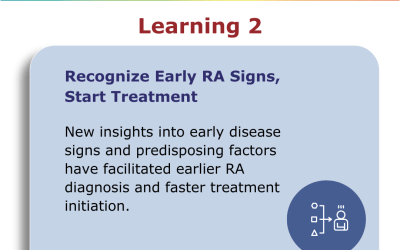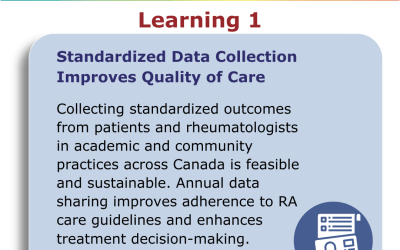Top 15 Learnings
Curious about what we’ve discovered over the past 15 years? Our infographic highlights the top 15 insights on rheumatoid arthritis treatments and outcomes. Watch the video below with CATCH Principal Investigator, Dr. Vivian Bykerk, and learn more about the project here >
Featured Video
Improving rheumatoid arthritis care
Dr. Carter Thorne talks about how CATCH has discovered early rheumatoid arthritis (RA) disease signs and predisposing factors. Stress and major life events can play a role in putting the whole picture together for clinicians and people with RA. Watch this short video to learn more!
About CATCH &
Rheumatoid Arthritis
CATCH is a Canadian multicentre research study that aims to improve the quality of care for people with early inflammatory arthritis.
CATCH is the only Canada-wide early arthritis cohort study that is following people with new onset inflammatory or rheumatoid arthritis over time to examine the course of their disease and their response to the treatments provided by their healthcare team. CATCH is one of the largest studies of its kind in the world. Learn More >
CATCH Vision
- To improve the lives of people with early rheumatoid arthritis (RA)
- To ensure more patients will have timely access to quality care
- To provide patients the best chance for an optimal outcome
- To focus research & educational efforts that will advance these goals Learn More >
Participants
Years of Follow up
Study Visits
Canadians with Rheumatoid Arthritis
“The CATCH study importantly benefits the future generations of those with RA, but has also has had a very personal positive impact for me. When I was first diagnosed with RA, I was extremely frightened and fearful of my future… My disease is now well managed and I am certainly more positive and not nearly as fearful of my future.”

Do you have rheumatoid arthritis and want to help others to find ways to better manage living with RA?
You can help others with RA by participating in the CATCH study.
News
Videos about Early diagnosis, early treatment
Recent CATCH insights are transforming how we detect rheumatoid arthritis at...
Videos about Improving rheumatoid arthritis care
Did you know that collecting standardized outcomes from patients and...
Videos about innovations in RA treatment and care
We have a new set of videos available about new ways to treat and care for...
Videos about RA and other health conditions
We have a new set of videos available about RA and other health conditions....




